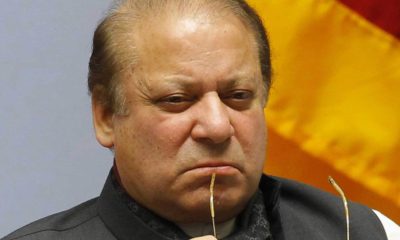World
Pakistan hangs seven more convicts

Islamabad: Seven more convicts were hanged in Pakistan Tuesday taking the total number of executions to 17 since December last year, a media report said.
The hangings took place in Karachi, Sukkur, Faisalabad and Rawalpindi jails, Dawn online reported.
The executed terrorists were Behram Khan, Shahid Haneef, Muhammad Talha, Khaleel Ahmed, Zulfikar Ali, Mushtaq Ahmed and Nawazish Ali.
Behram Khan was found guilty of killing an advocate in a courtroom of the Sindh High Court in April 2003.
Shahid Haneef, Muhammad Talha and Khaleel Ahmed were found guilty by an anti-terrorism court in Karachi of killing a senior officer in the defence ministry in July 2001.
Zulfikar Ali was associated with al Qaeda and was convicted of killing two policemen near the US Consulate General in Karachi.
Mushtaq Ahmed and Nawazish Ali were executed for their involvement in a 2003 attempt to kill then president Gen. (retd.) Pervez Musharraf.
On Dec 17, Pakistan lifted a moratorium on the death penalty in terror-related cases following a terrorist attack on the Army Public School in Peshawar Dec 16, 2014 in which Tehreek-e-Taliban Pakistan (TTP) militants killed over 140 people, mostly children.
Pakistan has now executed 17 terrorists since the moratorium on the death penalty was lifted.
World
Lockdowns in China Force Urban Communities to Defy Censorship and Vent Frustration Online

Shanghai’s rich middle class is leading a wave of online dissent over the strict and prolonged lockdowns imposed in various parts of the country. Chinese internet censorship is struggling as patience is wearing thin in many urban centers, coming up with creative forms of online protests.
Social Media Posts Revealing Lockdown Tension in Shanghai
Drawn-out lockdowns are nothing new in China as authorities insist with the nation’s zero-Covid policy since the start of the pandemic. Currently over This time around, however, metropolitan areas like Shanghai are increasingly difficult to keep quiet, given that its more than 25 million residents have seen weeks of total isolation along with food shortages and many other service interruptions.
Dozens of towns and reportedly over 300 million Chinese citizens have been affected by lockdowns of different severity. As expected, urban netizens have been most outspoken over their difficulties by finding creative ways to get around state censorship and bans placed on topics, news comments and spontaneous campaigns.
Shanghai residents have been using mobile proxies and hijacking seemingly unrelated hashtags to talk about healthcare issues, delivery failures and the overall severity of their situation. The “positive energy” that the Chinese government wants to transmit during the recent prolonged series of lockdowns does not come naturally to those counting food supplies and online censors are working hard to filter words, trending topics and undesired social media sharing.
WeChat groups and message threads are under constant monitoring. Posts questioning the zero-Covid approach have been quickly deleted, including by leading Chinese health experts like Dr. Zhong Nanshan. Video footage is soon censored and protests and investigations are quickly made to disappear.
Where this has not worked, officials have exposed banners with warnings and outright threats like “watch your own mouth or face punishment”, while drones have been patrolling the city skies. Yet, if anything, this has led to further tensions and unspoken confrontation with Shanghai’s educated and affluent middle class.
Creative Online Solutions Harnessing Civic Energy
Announcements by Chinese social media that they would be publishing the IP addresses of users who “spread rumors” have not helped either. Tech industry research has shown that much of Asia’s tech-savvy population has a habit of using mobile proxies and other privacy tools, quickly finding workarounds to browse the internet freely and talk to the world about the hottest topics.
The sheer volume of forbidden posts is already a challenge for the very censorship system, experts explain. Unable to track all trending hashtags, state workers overlook topics that speak about the US, Ukraine or other popular news. Linking human rights elsewhere to their situation, Chinese online dissidents establish their informal channels and “hijack” the conversation to share personal or publicly relevant information about the Covid suppression in their town.
Sarcastic and satirical posts still dominate. Others hope to evade the censors by replacing words from famous poems or the national anthem. One thing is certain – social media, when harnessed with the right creativity, has proven its ability to mount pressure on the government in even some of the most strictly controlled tech environments like China.























